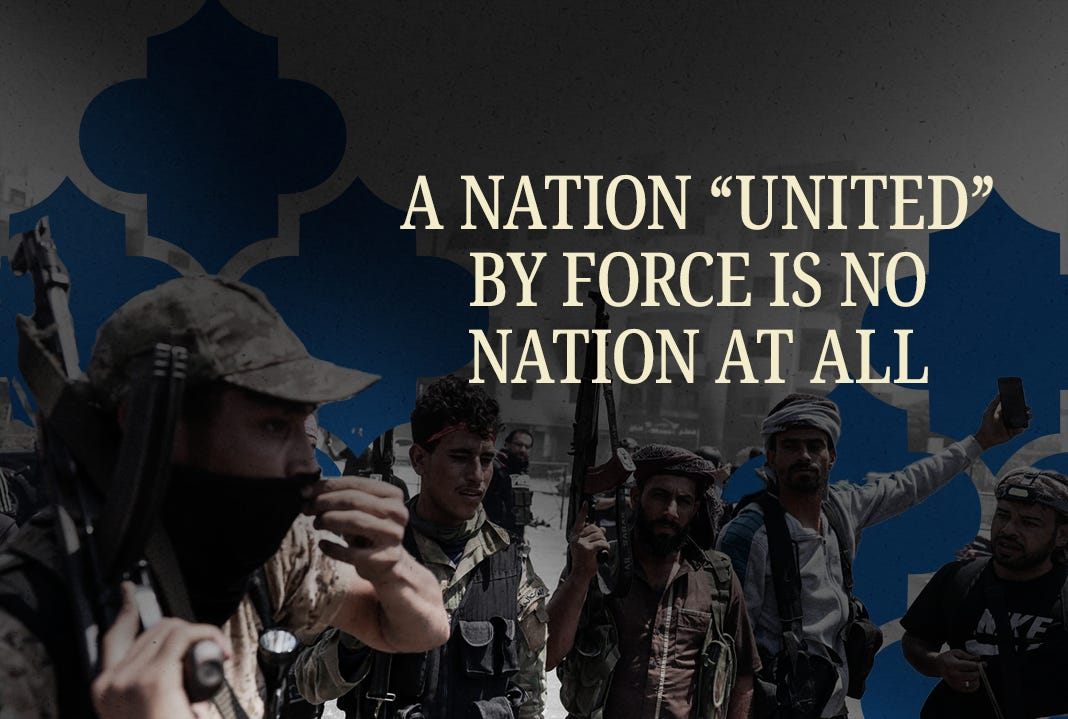A Nation “United” by Force Is No Nation at All
The Syrian interim government’s suppression of dissent risks unraveling what’s left of national cohesion
As Syria’s interim government pursues reunification through force, it is corroding the social fabric it claims to want to restore. In its quest to consolidate control over the country’s fragmented geography, the government has relied on extreme factions and violent suppression. Its victories are pyrrhic, each one marred by humiliation, civilian displacement, and deepening insecurity.
In March, the interim government deployed a coalition of politicized military units and partisan militias to the coastal region in an effort to quash a localized insurgency. The campaign, infused with ideological extremism and foreign fighters, produced atrocities that shocked even Syria’s war-hardened population.
The civilian toll was devastating. Hundreds were detained, tortured, and killed. In response to growing outcry, the interim government announced an internal investigation, promising accountability within a two-month mandate, which was subsequently extended. That deadline passed more than a week ago with no public findings—an omission that did not go unnoticed. Almost 12 days after the deadline, the Syrian interim presidency announced it had received the report. However, the findings were not made public, and the president’s statement raised concerns by indicating that the presidency would conduct its own thorough review—suggesting the results may not be final.
For Syria’s minority communities, such as the Druze in Suwayda, the message was clear: justice will not be done under the banner of this government.
This erasure of institutional trust is a critical, yet consistently overlooked, variable in Syria’s fragile calculus. History offers a sobering lesson that governance through coercion cannot yield prosperity. The Soviet Union failed despite overwhelming power; Venezuela and Sudan collapsed under similar logic. Syria risks joining their ranks unless its leaders confront the limits of violence-driven centralization.
Throughout the 14-year civil war, the Druze of Suwayda adopted a pacifist posture, rejecting conscription into Assad’s army and resisting entanglement in broader sectarian battles. Their armed groups were defensive, organized to repel ISIS incursions rather than assert territorial control.
Following Assad’s ouster, the Druze renewed calls for a decentralized and pluralistic political structure. Their vision is rooted in communal autonomy, not fragmentation. Yet the interim government, determined to reimpose centralized rule, greeted these appeals with thinly veiled hostility. The tension simmered until it exploded in July 2025.
A local dispute between Druze and Bedouin communities escalated rapidly. While the interim government publicly promised de-escalation, it simultaneously deployed artillery and armor to the region. On social media, Syrian army units were seen chanting sectarian slogans, declaring solidarity with the Bedouin. For the Druze, this was a prelude to siege.
Haunted by memories of Alawite massacres and lacking confidence in government intentions, the Druze mobilized. Across the border, their kin in Israel demanded protection. Israeli forces provided air support, blunting the initial offensive.
In retaliation, the interim government withdrew and allowed tribal militias to overrun Druze areas. State-aligned media launched a campaign portraying the Druze as traitors. The result was the transformation of a local clash into a perceived existential crisis.
Atrocities followed on both sides. Some Druze militants, after fending off government forces, attacked Bedouin civilians. Meanwhile, outdated videos were circulated online, falsely implicating Druze fighters in fresh massacres. The footage ignited outrage across tribal communities, culminating in a “Faza’a”—a mass mobilization in support of the Bedouin. Armed convoys from across Syria began converging on Suwayda, turning a regional flare-up into a full-blown disaster.
Israeli involvement did not abate. Its air support to the Druze remained active as the conflict intensified. On July 19, Jordan hosted a tripartite summit with Syrian and U.S. officials. The parties agreed to a ceasefire, but reports from the ground suggest the violence continues unabated. The interim government appears either unwilling or unable to compel tribal militias to disengage.
Syria’s strained national identity may be dissolving altogether.
A few months ago, U.S. Secretary of State Marco Rubio declared that Syrians share a unifying national identity. That may still be true in theory. But in practice, the interim government’s actions are accelerating identity erosion. Appeals for international intervention have become routine among minority communities, as they grow increasingly alienated.
Rather than address these fears, the interim government has branded dissenting voices as traitors. If Damascus continues on this path—disregarding decentralization, suppressing pluralism, and allowing tribal proxies to fuel sectarian war—then Syria’s already tentative borders may not hold.
The consequences of the collapse of national identity would not be contained within Syria’s borders. It would further devastate the Middle East, inviting chaos into a region bracing for its next catastrophe. The window to act is closing. The interim government must change course before there is no Syria left to govern.
Middle East Uncovered is powered by Ideas Beyond Borders. The views expressed in Middle East Uncovered are those of the authors and do not necessarily reflect the views of Ideas Beyond Borders.





"Venezuela and Sudan collapsed under similar logic"
Not so in the case of Venezuela, which has been a united country since Independence in 1824 and with democratic government from 1958 until the election of Hugo Chavez in 1998. Venezuela has never had separate communities with identities that supersede the national identity. There has never been a separatist movement in Venezuela since the end of the warlord era in 1905 and the unification of the country under Cipriano Castro and his successor Juan Vicente Gomez.
This is unlike Lebanon, Syria, Iraq where separate communities of Sunni, Shiite, Druze, Kurds have less allegiance to the country that their own grouping.